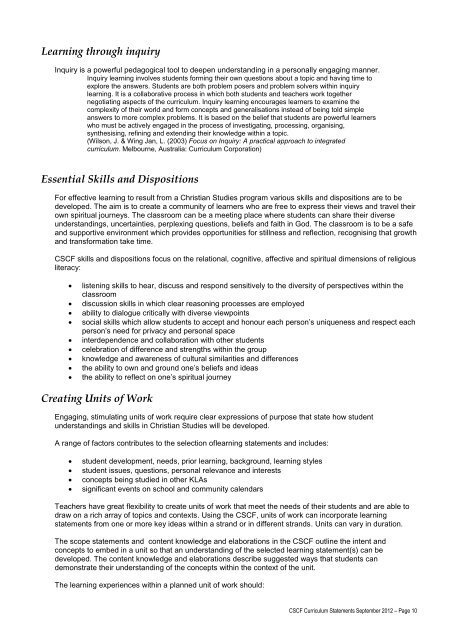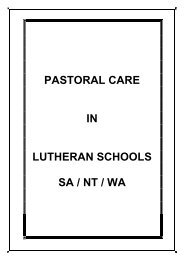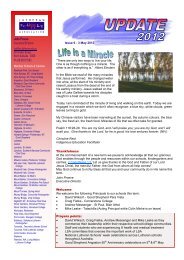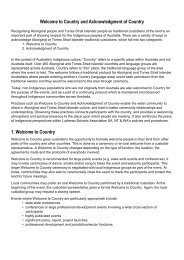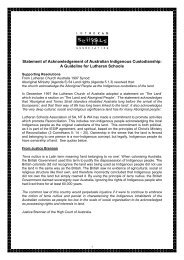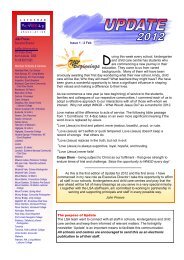2012 CSCF Curriculum Statements.pdf - Lutheran Schools ...
2012 CSCF Curriculum Statements.pdf - Lutheran Schools ...
2012 CSCF Curriculum Statements.pdf - Lutheran Schools ...
You also want an ePaper? Increase the reach of your titles
YUMPU automatically turns print PDFs into web optimized ePapers that Google loves.
Learning through inquiryInquiry is a powerful pedagogical tool to deepen understanding in a personally engaging manner.Inquiry learning involves students forming their own questions about a topic and having time toexplore the answers. Students are both problem posers and problem solvers within inquirylearning. It is a collaborative process in which both students and teachers work togethernegotiating aspects of the curriculum. Inquiry learning encourages learners to examine thecomplexity of their world and form concepts and generalisations instead of being told simpleanswers to more complex problems. It is based on the belief that students are powerful learnerswho must be actively engaged in the process of investigating, processing, organising,synthesising, refining and extending their knowledge within a topic.(Wilson, J. & Wing Jan, L. (2003) Focus on Inquiry: A practical approach to integratedcurriculum. Melbourne, Australia: <strong>Curriculum</strong> Corporation)Essential Skills and DispositionsFor effective learning to result from a Christian Studies program various skills and dispositions are to bedeveloped. The aim is to create a community of learners who are free to express their views and travel theirown spiritual journeys. The classroom can be a meeting place where students can share their diverseunderstandings, uncertainties, perplexing questions, beliefs and faith in God. The classroom is to be a safeand supportive environment which provides opportunities for stillness and reflection, recognising that growthand transformation take time.<strong>CSCF</strong> skills and dispositions focus on the relational, cognitive, affective and spiritual dimensions of religiousliteracy:listening skills to hear, discuss and respond sensitively to the diversity of perspectives within theclassroomdiscussion skills in which clear reasoning processes are employedability to dialogue critically with diverse viewpointssocial skills which allow students to accept and honour each person’s uniqueness and respect eachperson’s need for privacy and personal spaceinterdependence and collaboration with other studentscelebration of difference and strengths within the groupknowledge and awareness of cultural similarities and differencesthe ability to own and ground one’s beliefs and ideasthe ability to reflect on one’s spiritual journeyCreating Units of WorkEngaging, stimulating units of work require clear expressions of purpose that state how studentunderstandings and skills in Christian Studies will be developed.A range of factors contributes to the selection oflearning statements and includes:student development, needs, prior learning, background, learning stylesstudent issues, questions, personal relevance and interestsconcepts being studied in other KLAssignificant events on school and community calendarsTeachers have great flexibility to create units of work that meet the needs of their students and are able todraw on a rich array of topics and contexts. Using the <strong>CSCF</strong>, units of work can incorporate learningstatements from one or more key ideas within a strand or in different strands. Units can vary in duration.The scope statements and content knowledge and elaborations in the <strong>CSCF</strong> outline the intent andconcepts to embed in a unit so that an understanding of the selected learning statement(s) can bedeveloped. The content knowledge and elaborations describe suggested ways that students candemonstrate their understanding of the concepts within the context of the unit.The learning experiences within a planned unit of work should:<strong>CSCF</strong> <strong>Curriculum</strong> <strong>Statements</strong> September <strong>2012</strong> – Page 10


